
Razia Jan, born in Afghanistan is the founder of Razia's Ray of Hope Foundation, a nonprofit education organization in Afghanistan. [1]

Razia Jan, born in Afghanistan is the founder of Razia's Ray of Hope Foundation, a nonprofit education organization in Afghanistan. [1]
Jan moved to the United States in 1970 to go to college. [2] The proprietor of a small tailoring business in Duxbury, Massachusetts, she served as president of the town's Rotary Club. [3] [4]
After September 11, 2001, Jan rallied her New England community to send over 400 homemade blankets to rescue workers at Ground Zero. [5] Her efforts expanded to include sending care packages to US troops in Afghanistan. Through her involvement in the military's Operation Shoe Fly, she coordinated the delivery of over 30,000 pairs of shoes to needy Afghan children. [5]
In 2008, she opened a free all girls' school in Afghanistan, the Zabuli Education Center, [6] [7] [8] starting with 109 students. [2] The school is mostly funded by private donors. [2] In 2021 that had grown to 800 students, [9] but then was forced to shut under the new Taliban regime following the 2021 Taliban offensive. The school was allowed to re-open for primary school students, but was forced to stop educating secondary students. [10] [11]
In 2017, she opened the Razia Jan Institute for Medical Sciences, which was a free two-year midwifery certification college. The first students graduated in 2019. The college was shut indefinitely in 2021 due to new restrictions on women's education. A new teacher certification program was due to start in 2021, [11] but was never launched due to legal restrictions. [12]
Jan is the subject of a children's picture book biography, Razia's Ray of Hope: One Girl's Dream of an Education, written by Elizabeth Suneby and illustrated by Suana Verelst, published by Kids Can Press in 2013. [13] [14] [15] [16] The book came to the attention of Roya Hosseini and was then used as part of curriculum of the Khaled Hosseini Foundation. [17] Razia's Ray of Hope was a Jane Addams Children’s Book Award Honor Title in 2014. [18]

The Taliban, which also refers to itself by its state name, the Islamic Emirate of Afghanistan, is an Afghan political and militant movement with an ideology comprising elements of Pashtun nationalism and the Deobandi movement of Islamic fundamentalism. It ruled approximately 75% of Afghanistan from 1996 to 2001, before it was overthrown by an American invasion after the September 11th attacks carried out by the Taliban's ally al-Qaeda. The Taliban recaptured Kabul in August 2021 following the departure of coalition forces, after 20 years of Taliban insurgency, and now controls the entire country. The Taliban government is not recognized by any country and has been internationally condemned for restricting human rights, including women's rights to work and have an education.

The treatment of women by the Taliban refers to actions and policies by two distinct Taliban regimes in Afghanistan which are either specific or highly commented upon, mostly due to discrimination, since they first took control in 1996. During their first rule of Afghanistan, the Taliban were notorious internationally for their misogyny and violence against women. In 1996, women were mandated to wear the burqa at all times in public. In a systematic segregation sometimes referred to as gender apartheid, women were not allowed to work, nor were they allowed to be educated after the age of eight. Women seeking an education were forced to attend underground schools, where they and their teachers risked execution if caught. They were not allowed to be treated by male doctors unless accompanied by a male chaperone, which led to illnesses remaining untreated. They faced public flogging and execution for violations of the Taliban's laws.
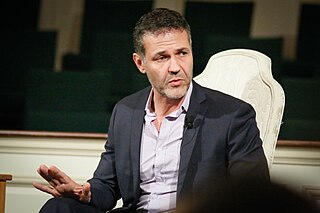
Khaled Hosseini is an Afghan-American novelist, UNHCR goodwill ambassador, and former physician. His debut novel The Kite Runner (2003) was a critical and commercial success; the book and his subsequent novels have all been at least partially set in Afghanistan and have featured an Afghan as the protagonist. Hosseini's novels have enlightened the global audience about Afghanistan's people and culture.
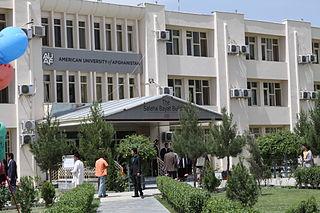
Education in Afghanistan includes K–12 and higher education, which is under the Ministry of Education and Ministry of Higher Education. In 2021, there were nearly 10 million students and 220,000 teachers in Afghanistan. The nation still requires more schools and teachers. Soon after the Taliban take took the country in August 2021, they banned girls from secondary education. Some provinces still allow secondary education for girls despite the ban. In December 2022, the Taliban government also prohibited university education for females in Afghanistan, sparking protests and international condemnation. In December 2023, investigations were being held by the United Nations into the claim that Afghan girls of all ages were allowed to study at religious schools.

Duxbury High School is a public high school located in the town of Duxbury, Massachusetts, United States, and operating in the Duxbury Public School District. The superintendent of the Duxbury Public School District is Danielle Klingaman, the assistant superintendent is Beth Wilcox and the principal of Duxbury High School is Todd Warmington. The building that houses the Duxbury Middle and High School is located at 71 Alden Street, Duxbury, MA and was newly constructed in 2014. The Duxbury High School mascot is the Dragons and its school colors are green, white, and silver.

Sakena Yacoobi is an Afghani activist known for her work for promoting access to education for women and children. She is the founder and executive director of the women-led NGO Afghan Institute of Learning. For her work, Yacoobi has received international recognition, including the 2013 Opus Prize, the 2015 WISE Prize, the 2016 Harold W. McGraw Prize in Education, and an honorary degree from Princeton University.
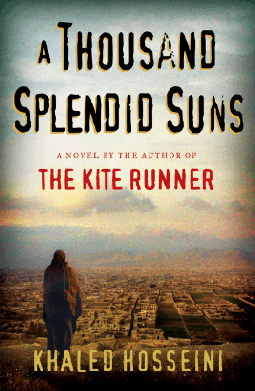
A Thousand Splendid Suns is a 2007 novel by Afghan-American author Khaled Hosseini, following the huge success of his bestselling 2003 debut The Kite Runner. Mariam, an illegitimate teenager from Herat, is forced to marry a shoemaker from Kabul after a family tragedy. Laila, born a generation later, lives a relatively privileged life, but her life intersects with Mariam's when a similar tragedy forces her to accept a marriage proposal from Mariam's husband.

Women's rights in Afghanistan are severely restricted by the Taliban. In 2023, the United Nations termed Afghanistan as the world's most repressive country for women. Since the US troops withdrawal from Afghanistan in 2021, the Taliban gradually imposed restrictions on women's freedom of movement, education, and employment. Women are banned from studying in secondary schools and universities, making Afghanistan the only country to prohibit females from studying beyond the sixth grade. Women are not allowed in parks, gyms, or beauty salons. They are forbidden from going outside for a walk or exercise, from speaking or showing any part of their face or body outside the home, or even from singing or reading from within their own homes if they could be heard by strangers outside. In extreme cases, women have reportedly been subjected to gang-rape and torture in Taliban prisons.
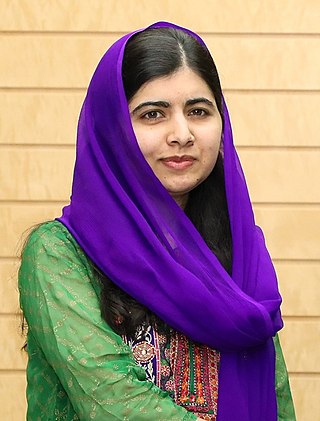
Malala Yousafzai is a Pakistani female education activist, film and television producer, and the 2014 Nobel Peace Prize laureate at the age of 17. She is the youngest Nobel Prize laureate in history, the second Pakistani and the only Pashtun to receive a Nobel Prize. Yousafzai is a human rights advocate for the education of women and children in her native homeland, Swat, where the Pakistani Taliban had at times banned girls from attending school. Her advocacy has grown into an international movement, and according to former Prime Minister Shahid Khaqan Abbasi, she has become Pakistan's "most prominent citizen."
Shabana Basij-Rasikh is an Afghan educator, humanitarian, and women's rights champion. She is the founder of Hela, inc. and School of Leadership, Afghanistan, and has received worldwide recognition for her work.
The Afghanistan National Institute of Music (ANIM) is an exiled school of music that was formerly operated in Kabul, Afghanistan and is currently based in Lisbon, Portugal. It was founded in 2010 by the Afghan-Australian ethnomusicologist Dr. Ahmad Naser Sarmast, and offers a curriculum combining the tuition of both Afghan and Western music. ANIM is a co-educational institute.
Higher education in Afghanistan, including post-secondary education, known locally as third-level or tertiary education, falls under the Ministry of Higher Education which establishes government policies to reform higher education at Afghan universities.
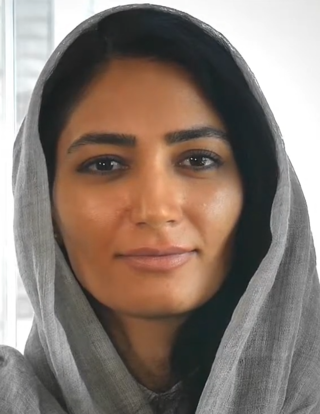
Fereshteh Forough is an Afghan social activist and the CEO and founder of Code to Inspire (CTI), the first coding school for girls in Afghanistan. She is an advocate for gender equality and the empowerment of women in developing countries through digital literacy, education, and financial independence.
On 8 May 2021, a car bombing, followed by two more improvised explosive device (IED) blasts, occurred in front of Sayed al-Shuhada school in Dashte Barchi, a predominantly Shia Hazara area in western Kabul, Afghanistan, leaving at least 90 people dead and 240 injured. The majority of the casualties were girls between 11 and 15 years old. The attack took place in a neighborhood that has frequently been attacked by militants belonging to the regional Islamic State – Khorasan Province (IS-K) over the years.
Marianne O'Grady is an American teacher and Afghanistan's deputy country director for Care International who said that the Taliban "cannot un-educate millions of people" in the fall of Kabul (2021) and anticipated that women would continue to teach other women and girls, even if forced back "behind the wall".
School of Leadership Afghanistan or SOLA is an all-girls boarding school in Kabul, Afghanistan. It was founded by Shabana Basij-Rasikh. It is the first boarding school for girls in Afghanistan.
The politics of Afghanistan' are based on a totalitarian emirate within the Islamic theocracy in which the Taliban Movement holds a monopoly on power. Dissent is not permitted, and politics are mostly limited to internal Taliban policy debates and power struggles. As the government is provisional, there is no constitution or other basis for the rule of law. The structure is autocratic, with all power concentrated in the hands of the supreme leader and his clerical advisors. According to the V-Dem Democracy indices Afghanistan was as of 2023 the 4th least electoral democratic country in the world.
The 20-year-long War in Afghanistan had a number of significant impacts on Afghan society.
Matiullah Wesa is an Afghan girl's education advocate and the founder of The Pen Path organisation.
Elizabeth "Liz" Suneby is a children's book author.